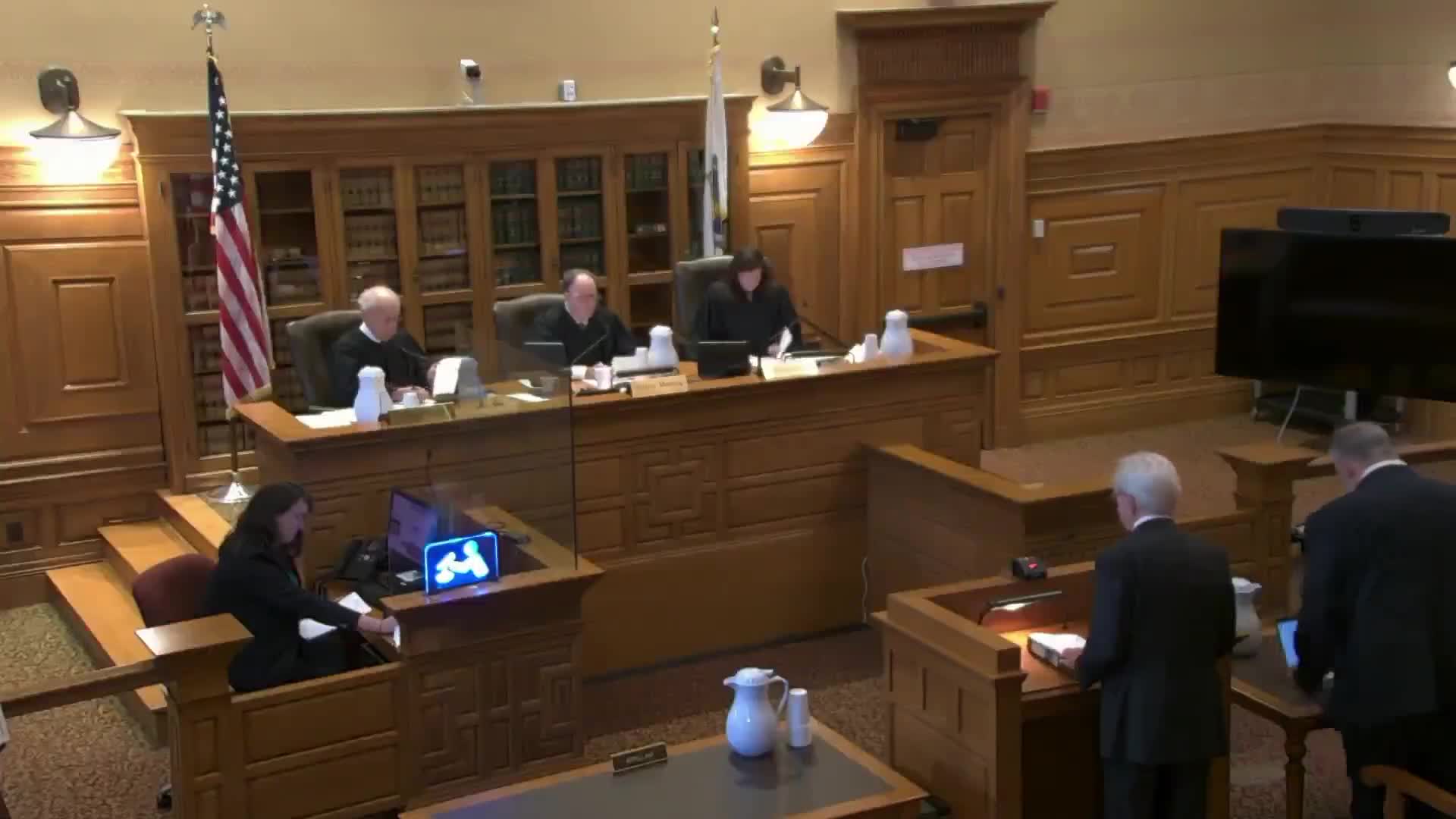Appeals court hears dispute over street stop, search of jacket and whether statements are fruits of an unlawful search
October 04, 2025 | Judicial - Appeals Court Oral Arguments, Judicial, Massachusetts
This article was created by AI summarizing key points discussed. AI makes mistakes, so for full details and context, please refer to the video of the full meeting. Please report any errors so we can fix them. Report an error »

The Massachusetts Appeals Court heard argument Oct. 3 in Commonwealth v. Frederick Jackson Jr., an interlocutory appeal of a suppression ruling in a criminal case arising from a street stop.
Defense counsel Charles McGinty argued officers went beyond a lawful Terry stop when they reached into Jackson's jacket and opened his suitcase, and that statements elicited while police were searching were therefore inadmissible as the fruit of an unlawful search. "The officers moved toward his jacket and ultimately toward his luggage and ultimately toward his person''at that point they had no reasonable suspicion to continue," McGinty told the panel.
McGinty said the search escalated at a point he identifies on the evidence video and that the Commonwealth effectively conceded there was no convincing argument of attenuation connecting the search to later statements. "The Commonwealth effectively concedes linkage between the statements and the wrong," McGinty argued, citing common-law exclusionary-rule authorities.
The Commonwealth, represented by Paul Lin, said officers were responding to a 911 report that a person had threatened to shoot customers and staff at the restaurant Eataly and that the report supplied reasonable grounds for the stop and for an expanded inquiry focused on officer safety. Lin told the court the initial stop and pat frisk were justified and disputed the defense's timeline of when a frisk became a search.
The panel pressed both sides on details visible in body-camera footage and timing of statements. McGinty identified several utterances he said occurred after officers had begun reaching into pockets and removing items, and argued that those statements should be suppressed under the Fourth Amendment and Article 14 jurisprudence. The Commonwealth disputed the causal link: it said some arguably incriminating statements occurred while the officers were still conducting a pat frisk and pointed to other portions of the video showing the defendant standing and conversing when not being searched.
The parties also debated whether Miranda custody issues were necessary to decide if the court found a Fourth Amendment violation; defense counsel argued suppression of the statements would follow without reaching the Miranda question. The Commonwealth said suppression would turn on whether the statements were fruits of illegality and whether the illegal act preceded the statements.
The court took the case under submission after argument. No ruling was made at the hearing.
Why it matters: The appeal asks the court to clarify where a lawful Terry frisk ends and an unlawful search begins when officers handle a suspect's clothing and belongings on the street, and whether spontaneous statements made during that interval must be excluded as fruits of an unlawful search.
Defense counsel Charles McGinty argued officers went beyond a lawful Terry stop when they reached into Jackson's jacket and opened his suitcase, and that statements elicited while police were searching were therefore inadmissible as the fruit of an unlawful search. "The officers moved toward his jacket and ultimately toward his luggage and ultimately toward his person''at that point they had no reasonable suspicion to continue," McGinty told the panel.
McGinty said the search escalated at a point he identifies on the evidence video and that the Commonwealth effectively conceded there was no convincing argument of attenuation connecting the search to later statements. "The Commonwealth effectively concedes linkage between the statements and the wrong," McGinty argued, citing common-law exclusionary-rule authorities.
The Commonwealth, represented by Paul Lin, said officers were responding to a 911 report that a person had threatened to shoot customers and staff at the restaurant Eataly and that the report supplied reasonable grounds for the stop and for an expanded inquiry focused on officer safety. Lin told the court the initial stop and pat frisk were justified and disputed the defense's timeline of when a frisk became a search.
The panel pressed both sides on details visible in body-camera footage and timing of statements. McGinty identified several utterances he said occurred after officers had begun reaching into pockets and removing items, and argued that those statements should be suppressed under the Fourth Amendment and Article 14 jurisprudence. The Commonwealth disputed the causal link: it said some arguably incriminating statements occurred while the officers were still conducting a pat frisk and pointed to other portions of the video showing the defendant standing and conversing when not being searched.
The parties also debated whether Miranda custody issues were necessary to decide if the court found a Fourth Amendment violation; defense counsel argued suppression of the statements would follow without reaching the Miranda question. The Commonwealth said suppression would turn on whether the statements were fruits of illegality and whether the illegal act preceded the statements.
The court took the case under submission after argument. No ruling was made at the hearing.
Why it matters: The appeal asks the court to clarify where a lawful Terry frisk ends and an unlawful search begins when officers handle a suspect's clothing and belongings on the street, and whether spontaneous statements made during that interval must be excluded as fruits of an unlawful search.
View full meeting
This article is based on a recent meeting—watch the full video and explore the complete transcript for deeper insights into the discussion.
View full meeting
